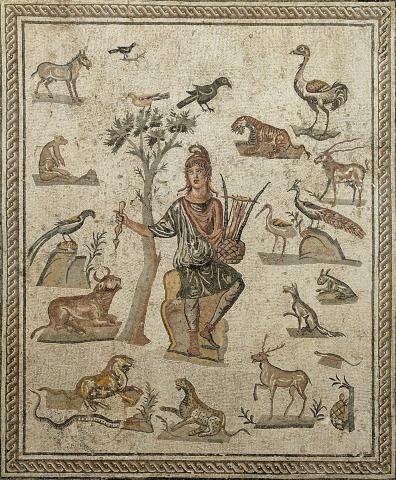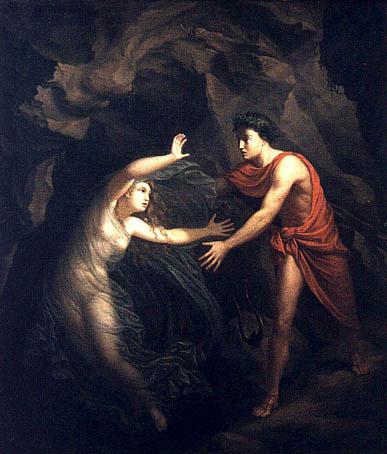Immītēs potuit flectere cantibus
umbrārum dominōs et prece supplicī570
Orpheus, Eurydicēn dum repetit suam.
quae silvās et avēs saxaque trāxerat
ars, quae praebuerat flūminibus morās,
ad cuius sonitum cōnstiterant ferae,
mulcet nōn solitīs vōcibus īnferōs575
et surdīs resonat clārius in locīs.
dēflent Eumenides Thrēiciam nurum,
dēflent et lacrimīs difficilēs deī;
et quī fronte nimis crīmina tetricā
quaerunt ac veterēs excutiunt reōs580
flentēs Eurydicēn iūridicī sedent.
tandem mortis ait "Vincimur" arbiter,
"ēvāde ad superōs, lēge tamen datā:
tū post terga tuī perge virī comes,
tū nōn ante tuam respice coniugem,585
quam cum clāra deōs obtulerit diēs
Spartānīque aderit iānua Taenarī."
ōdit vērus amor nec patitur morās:
mūnus dum properat cernere, perdidit.
Quae vincī potuit rēgia carmine,590
haec vincī poterit rēgia vīribus.
Notes
Orpheus has already managed to return from the land of the dead, and he had only the force of his music, not the strength of the mighty Hercules.
This is the Chorus’s final hope for Hercules’ return. But the tragic conclusion of the Orpheus myth—he lost Eurydice a second time—hints at the upcoming tragedy for Hercules. Like Orpheus, Hercules’ return will be accompanied by the death of his wife (and children).
569–71 Prose order: Orpheus, dum Eurydicēn suam repetit, immītēs dominōs umbrārum cantibus et prece supplicī flectere potuit. Seneca’s word order emphasizes emotive words (immītēs and suam) at the start and end of the sentence and highlights the important word cantibus (see 569n.) near the beginning of the sentence. It also allows him to place Orpheus and Eurydicēn side by side, illustrating the power of Orpheus’ voice to win him an improbable reunion with the dead Eurydice.
569 cantibus: ablative of means (AG 408), as is prece supplicī (570). Cantibus contrasts with manū (566) and vīribus (591): if Orpheus could change the rules of death with mere music, Hercules should be able to do the same with force.
571 Orpheus: two syllables (-eu- is a diphthong, as in Greek). Eurydicēn: accusative singular in –ēn, a Greek declension (AG 44).
572–74 quae … ars: reverse the order when translating: “the art which…” ars is the antecedent of all three relative pronouns in 572–74. Orpheus’ song exerted a magical power over nature. See, e.g., this Roman floor mosaic of Orpheus attracting wild animals, or Ovid’s long, tongue-in-cheek catalogue of all the types of trees that moved in to listen to Orpheus’ song (Metamorphoses 10.86–105). Seneca structures his description through anaphora with polyptoton of the relative pronoun (quae … quae … cuius).
572 trāxerat: = attrāxerat, “had drawn in” or “had attracted.” The use of a simple verb in place of the compound is a favorite device of Vergil (e.g. Eclogues 1.3: dulcia linquimus arva, “we leave the sweet fields,” instead of dulcia relinquimus arva) and other Latin poets.
573 praebuerat flūminibus morās: Orpheus’ song stopped rivers from flowing. The roundabout phrasing is consistent with Seneca’s tendency to convey information with nouns (morās) rather than verbs. Compare Horace’s description at Odes 1.12.9–10 rapidās morantem / flūmina lapsūs (“[Orpheus] delaying the rapid flow of rivers”).
574 ad … sonitum: “at the sound,” i.e., when they heard it.
575 mulcet: the subject of this verb is ars, the antecedent of the relative clauses in 572–74. vōcibus: “sound, vocalizations” (LS vox II.A), referring to Orpheus’ song. nōn solitīs: the Underworld is usually described as silent, or filled with sounds of pain and torment. Orpheus’ beautiful song would thus be “not usual.” nōn solitīs is more emphatic than īnsolitīs (“unusual”). It also fits conveniently into the meter (the initial vowel of īnsolitīs would have made the final syllable of mulcet scan short, instead of long, as required).
576 surdīs ... locīs: the Underworld is traditionally “silent,” and its rulers are “unwilling to listen” to prayers. surdus, –a,–um can have either of these meanings.
577–78 dēflent … dēflent: anaphora is common in passages of heightened emotion. Here, it is accompanied by alliteration of “d” (dēflent … difficilēs deī).
577 Eumenides: in Greek, this means “the gracious goddesses,” a euphemism for the Furies. The “e” in the final syllable is short, following Greek rules of declension (AG 81), as at line 87. Thrēiciam nurum: “the Thracian young woman,” Eurydice (LS nurus II.C).
578 dēflent et: either reverse the word order in translation (“and [the gods] cry”) or translate et as etiam (“[the gods] also cry”). lacrimīs difficilēs deī: “the gods (who are) unyielding to tears,” i.e., Pluto and Proserpina. The dative lacrimīs with the adjective difficilēs (AG 383) describes what the gods do not normally yield to in two senses: the tears of a suppliant (Pluto is traditionally unmerciful) or their own tears (even more than most gods, Pluto does not normally cry; compare, e.g., Horace, Odes 2.14.6–7 illacrimābilem / Plūtōna, “Pluto, who does not cry”). Orpheus’ song breaks both of those normal rules.
579–81 The antecedent of quī is iūridicī in the last line: “and the judges, who investigate … and examine … sit weeping for Eurydice.” These judges of the dead were Rhadamanthus, Minos, and Aeacus. More than in modern courtrooms, Roman lawyers aimed to provoke an emotional response in judges; thus, the tears of the infernal judges indicate that Orpheus’ song has been effective.
579 fronte nimis … tetricā: “with a very stern brow.” The brow often indicated a person’s feelings, and so could be laeta, tristis, serēna, impudēns, etc.
580 veterēs excutiunt reōs: “examine former criminals.” Those who committed unavenged crimes in life long before were punished after death by the grim judges there.
581 Eurydicēn: accusative singular in –ēn, a Greek declension (AG 44). iūridicī: “judges,” literally, “speakers of justice” (iūs, iūris + dīco, dīcere), a legal word, found only here in Classical Latin poetry. It echoes the sound of Eurydicēn, giving a musical finish to the sentence (note also the rhyming start and end of the line: flentēs … sedent).
582 mortis … arbiter: Pluto
583 ad superōs: “to those above,” i.e. the land of the living, as at 568. lēge … datā: this twofold “condition,” which Pluto gives to Orpheus in lines 584–87, combines details found in Seneca’s two models. In Virgil, Eurydice is told to follow behind Orpheus (Georgics 4.485–87); in Ovid, Orpheus is told not to look back at Eurydice (Metamorphoses 10.50–53).
584–85 The first tū refers to Eurydice, the second to Orpheus. Further parallelism links these two commands together: post ~ ante, tuī ~ tuam, and two words beginning with “c” at the end of the line to describe Eurydice (comes ~ coniugem). There is also alliteration of “t” and “p,” and sound repetition in tū … tuī/tuam and terga … perge: Pluto tries (in vain) to make his commands memorable.
584 comes: the noun is predicative, describing how Eurydice should follow her husband (“as a companion”).
585–86 nōn ante … quam cum: “not earlier than when,” i.e., “not before.” ante … quam is commonly used to mean “before” (usually with each word at the start of the two clauses joined together, as in this passage). The addition of cum to ante … quam is highly unusual.
586 clāra deōs obtulerit diēs: “bright daylight discloses the heavens” (Fitch 2018). deōs is a metonymy for the sky where the Olympians live; Seneca uses it partly to produce sound play between deōs and diēs. obtulerit (> offerō, literally, “bring forward, expose”) is future perfect indicative; the meaning is nearly the same as a future indicative, and it produces a sound play between obtulerit and aderit in the next line.
587 Spartānīque … iānua Taenarī: Taenarus was a promontory in Spartan territory at the southernmost point of the Peloponnese (Cape Matapan); it supposedly held a cave that led to the Underworld. This entrance was used by Orpheus in both of Seneca’s models (Virgil, Georgics 4.467 and Ovid, Metamorphoses 10.13), and also by Hercules in this play (663, 813).
588 The extensive wordplay in this ode (e.g., 539 sēmita Sarmatīs, 565 mortis … morī, 567–68 invius ... viās, 581 Eurydicēn iūridicī) culminates in this epigrammatic expression of the destructive impatience of true love. The tension between desire and delay is spelled out with the anagrammatic pair amor/mora (Roman poets often exploited this anagram, along with the third one: Rōma). The oxymoron “love hates” recalls Catullus’ famous description of tortured love: ōdī et amō (poem 85). Finally, the opening phrase ōdit vērus amor might remind us of Virgil’s famous declaration of love’s inescapable power (which also opens with o- v- amor): omnia vincit Amor: et nos cedamus Amori (“Love conquers all: let us, too, yield to Love,” Eclogues 10.69).
589 perdidit: Seneca’s description of Eurydice’s disappearance perhaps has a moralistic tone, emphasized by her description as a “gift”: excessive greed leads to disaster. Seneca’s models focused instead on the visual effect of Eurydice disappearing “like smoke disintegrating in air” (Georgics 4.499–500 ceu fumus in auras / commixtus tenues). It is (of course) the visual potential of the scene that later painters seized upon; e.g., Orpheus and Eurydice by Christian Gottlieb Kratzenstein-Stub or Orphée et Eurydice by Michel Martin Drolling.
590–91 “The royal power that could be conquered by song will be able to be conquered by strength” (the elaborate parallelism of Seneca’s couplet cannot be idiomatically reproduced in English). %% carmine: one branch of the manuscript tradition transmits carmine (e.g., Par. Lat. 11855, 2nd column, 6th line from the bottom). The other branch transmits the synonym cantibus (e.g., Par. Lat. 8260, right hand page, 7th line from the bottom). Although both words have the same basic meaning, it seems more likely that Seneca wrote carmine, which was later corrupted into cantibus when a scribe looked ahead to the word directly below, 591 vīribus (which also ends in –ibus), or remembered the beginning of this passage on Orpheus, 569 immītēs potuit flectere cantibus.
Vocabulary
immītis –e: hard, harsh, cruel
flectō flectere flēxī flexus: to bend; turn, direct; persuade
cantus cantūs m.: singing or playing; melody; song
dominus –ī m.: master, lord
supplex supplicis: suppliant; humble, beseeching
Orpheus –eī m.: Orpheus, ancient bard and husband of Eurydice
Eurydicē –ēs f.: Eurydice, wife of Orpheus
sonitus sonitūs m.: noise
fera –ae f.: wild animal
mulceō mulcēre mulsī mulsus or mulctus: to stroke; soothe, soften
solitus –a –um: accustomed; customary, usual
inferī –ōrum m.: the dead; the lower world
surdus –a –um: deaf; unwilling to listen; silent
resonō –āre –āvī –ātus: to make noise again, resound, re-echo
dēfleō dēflēre dēflēvī dēflētus: to weep over, lament
Eumenides –um f.: Eumenides, the Furies
Thrēicius –a –um: Thracian
nurus nurūs f.: a daughter–in–law; young woman, married woman
tetricus –a –um: harsh, gloomy, stern
excutiō excutere excussī excussus: to shake off; cast out; examine, investigate
Eurydicē –ēs f.: Eurydice, wife of Orpheus
iūridicus –ī m.: a judge
arbiter arbitrī m.: witness; judge; ruler
ēvādō ēvādere ēvāsī ēvāsus: to go out, escape
coniūnx coniugis f.: spouse, wife
Spartānus –a –um: Spartan
iānua –ae f.: door
Taenarus or Taenaros –ī m. or Taenarum –ī n.: Taenarus
rēgia –ae f.: palace, court; royal power



